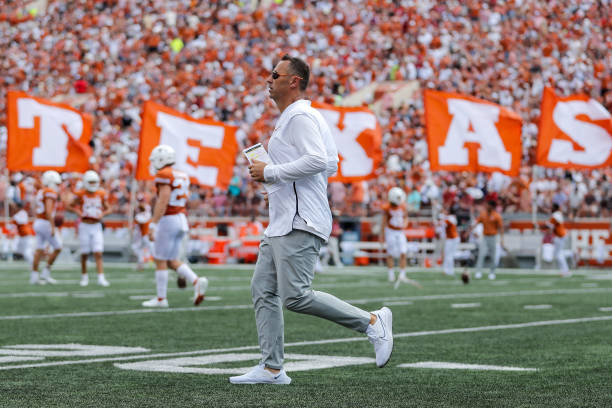In a stunning development that has sent shockwaves through the college football landscape, Jackson Arnold, the standout quarterback for the Oklahoma Sooners, has announced his commitment to the Texas Longhorns. The announcement marks a significant shift in the trajectory of Arnold’s promising career and has sparked intense discussion among fans and analysts alike.
Jackson Arnold, born on September 2, 2004, in Atlanta, Georgia, was destined for greatness on the football field from a young age. Growing up in Denton, Texas, Arnold attended John H. Guyer High School, where he honed his skills and developed into one of the most promising quarterbacks in the country.
During his freshman and sophomore years, Arnold served primarily as the backup to Eli Stowers, who would later go on to play for Texas A&M. Despite limited playing time in those early years, Arnold’s talent and potential were evident to those who watched him closely.
It was in his junior year that Arnold truly emerged as a force to be reckoned with. Taking the reins as the starting quarterback, he put up eye-popping numbers, passing for 3,921 yards and 34 touchdowns while also showcasing his dual-threat capabilities with 659 rushing yards and 12 rushing touchdowns. His performance on the field earned him widespread recognition and solidified his status as one of the top quarterback prospects in the nation.
Arnold’s junior year success did not go unnoticed by college recruiters. He quickly became a highly sought-after prospect, receiving 25 scholarship offers from major programs across the country. Initially rated as a four-star recruit, Arnold ultimately committed to play college football at the University of Oklahoma, a decision that thrilled Sooners fans and coaching staff alike.
At Oklahoma, Arnold was expected to follow in the footsteps of a long line of successful quarterbacks who have excelled in the Sooners’ high-powered offense. His commitment to the program was seen as a significant coup for Oklahoma and a testament to the coaching staff’s ability to attract top-tier talent.
The news of Jackson Arnold’s commitment to the Texas Longhorns has come as a surprise to many. While the specific reasons behind his decision remain private, it is clear that Arnold sees a unique opportunity at Texas that aligns with his personal and athletic goals.
For the Longhorns, landing Arnold is a major victory and a clear indication of the program’s upward trajectory under head coach Steve Sarkisian. Arnold’s decision to join Texas not only strengthens their quarterback room but also sends a powerful message to other recruits about the potential for success in Austin.
Arnold’s commitment to Texas has far-reaching implications for the college football landscape. For Oklahoma, the loss of a highly touted quarterback recruit is undoubtedly a setback. However, the Sooners’ program remains strong, and their ability to attract top talent will continue to be a cornerstone of their success.
For Texas, the addition of Arnold represents a significant boost to their roster and adds a new layer of excitement and anticipation for the upcoming seasons. With Arnold under center, the Longhorns will be looking to reassert themselves as a powerhouse in the Big 12 and beyond.
Jackson Arnold’s journey from high school phenom to college football star has taken an unexpected and thrilling turn with his commitment to the Texas Longhorns. As he prepares to embark on this new chapter, fans of both Oklahoma and Texas will be watching closely to see how his career unfolds. One thing is certain: Arnold’s decision has set the stage for a fascinating and competitive future in college football.

